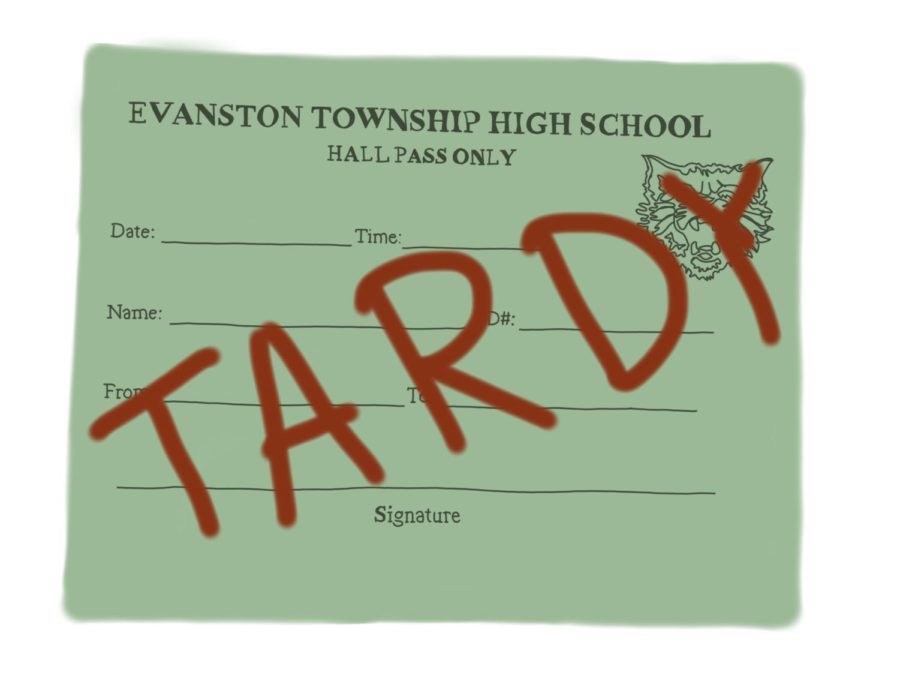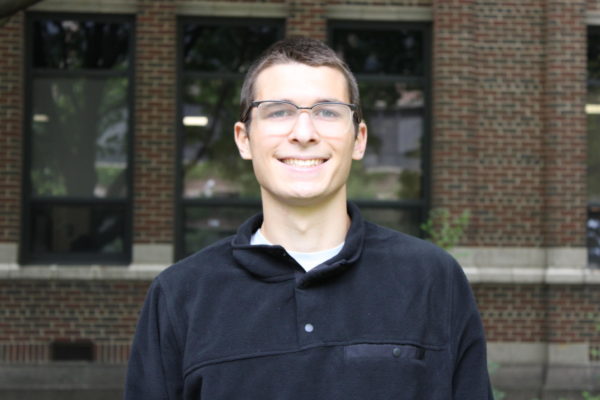Opinion | ETHS tardy, social probation policies are unjust
November 10, 2022
Two months ago, we, the three authors of this article, set out on a unique mission. Our goal was to analyze the current tardy and social probation policies at ETHS in their entirety and document the purpose and impact of them. After hours of researching, interviewing, and discussing our thoughts, we have finally come to a resounding conclusion: ETHS’ current policies are deeply flawed. Our gripes with the policies are two-fold—the first being that the social probation policy is astonishingly counterintuitive and, at times, harmful.
The goal of a social probation or tardy policy should be to not only discourage tardies but also lead students on the right path to improve their habits. The current system of ETHS fails to achieve this. Students who are put on social probation are unable to participate in clubs and sports. While this may seem helpful, as it gives a short-term incentive for a student to clear tardies, it also takes away a piece of community from this student and can ultimately cause them to lose motivation to clear them if they are accruing them for reasons outside of their control.
In a lengthy report entitled “Reimagining School Safety,” the Moran Center for Youth Advocacy exposes a harsh reality about ETHS’ system of social probation: it achieves very little in addressing student attendance.
“Recent medical studies have shown that student participation in extracurriculars after school hours is associated with higher levels of fulfillment and optimism and lower levels of anxiety and depression,” the report reads.
Thus, students who are failing to live up to academic standards should actually be encouraged to engage in extracurriculars. In fact, according to the Moran Center, blocking students from extracurriculars as we are doing now will only contribute to higher levels of anxiety and depression: a practice that no one could argue is beneficial.
Junior wrestler Grant Aaron sees his sport as a vital source of happiness.
“Playing a sport helped me make friends and created a community for me, so it seems super unfair that tardies can keep you out of clubs and carry over from year to year because I know personally being in a club has helped my mental health,” Aaron explains. “Wrestling is the highlight of my day, and I can’t imagine if that was taken away.”
So, while the act of barring students from their extracurricular activities may provide them with short-term motivation to improve their attendance, it could severely hinder their wellbeing in the long-term. During their time on probation, students will miss out on the friends, motivation and mental health benefits that come with participating in a school activity. Instead of creating rules that cause further harm to students on social probation, ETHS should look for ways to connect with students and place them onto the right track.
Our second problem with the current policies is that the tardy system is downright inequitable, heavily favoring students with easy access to transportation. As of now, it is way too common for students who live far from ETHS to fall into a cycle of tardiness. The location of someone’s household should not determine their likelihood to end up on social probation and be held out of clubs and sports. Simply put, students that are incapable of accessing transportation may face serious consequences, and be held accountable under uncontrollable circumstances.
“There’s definitely some guys on the team that I know got put on social probation at one point. Most of them live pretty far away [from ETHS]. It doesn’t make any sense that they should have to deal with that just because of where they live,” Aaron remarks.
Recently, students are finding themselves lacking adequate transportation more than ever. As an increasing number of bus routes are being shut down due to the national shortage of bus drivers, this could be particularly problematic for those that rely on bussing to get to school.
Despite these unfortunate conditions, other schools have begun to innovate and create new policies to support student transportation. For a good example of this, look no further than Chicago Public Schools.
According to their website, “CPS Transportation Services has been significantly impacted by the national bus driver shortage. As a result, we are prioritizing those students most in need of transportation services, maximizing those routes in service, and distributing financial assistance in order to ease the burden on those who traditionally rely on CPS for transportation.”
While we understand that implementing change will be a long and arduous process, we strongly believe that these solutions would solve many problems concerning transportation, tardies and the social probation system. Fixing our most egregious policies could vastly improve the functionality of our students.
Overall, school should be about equal opportunity and education. With these strict policies being enforced, we are not taking all people into consideration. We need to start observing the holes in our systems, taking action, and creating equitable opportunities for all.
“I think there’s a lot of room for improvement,” Aaron concludes. “And as long as a lot of us speak out against the policies, ETHS will have to listen.”









